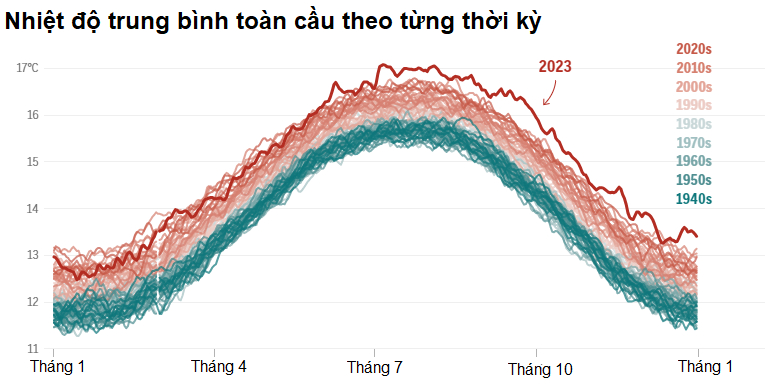According to the European climate agency Copernicus, the average temperature in 2023 is expected to be 1.48 degrees Celsius higher than pre-industrial levels. This is close to the 1.5-degree Celsius limit set in the 2015 Paris climate agreement that the world hopes to maintain to avoid the most severe impacts of warming.

2023 is officially the hottest year on record. Source: ERA5
The current warming trend, which is still underway, could see the 12-month average temperature exceed 1.5 degrees Celsius for the first time in January 2024, according to Copernicus Deputy Director Samantha Burgess. Climate scientists say that if the annual average temperature rises by more than 1.5 degrees Celsius, the effects of global warming will be irreversible.
"The 1.5-degree target must be maintained because lives are at risk. We have to make choices. These choices do not affect you and me, but they affect our children and grandchildren," said Mr Burgess.
Record heat over the past year has made life miserable, even deadly, in parts of Europe, North America, China and elsewhere.
In addition, climate warming is also the cause of more extreme weather events such as prolonged droughts ravaging the Horn of Africa, torrential rains that broke dams and killed thousands of people in Libya, and wildfires in Canada that heavily polluted the air from North America to Europe.

New York City skies polluted by wildfires in Canada. Photo: AP
"From our analysis, we are confident that the strong impacts suggest that 2023 will be the hottest year yet," Friederike Otto, lead climate scientist at Imperial College, said at a separate press event on Tuesday, estimating the impact of global warming on the frequency of extreme weather events.
“Basically, human-caused climate change will lead to more frequent and even hotter heat waves,” said Otto.
According to data released by the US National Oceanic and Atmospheric Administration (NOAA) on Tuesday, in 2023, the US experienced 28 weather disasters, causing at least $1 billion in damage, breaking the old record of 22 disasters in 2020. Meanwhile, in the 1980s, there were an average of only three disasters per year. In the 1990s, there were an average of just under six disasters per year.
The billion-dollar disasters in the U.S. last year included drought, four floods, 19 severe storms, two hurricanes, wildfires and winter storms. Together, these disasters killed 492 people and caused nearly $93 billion in damage, according to NOAA.

Anti-fossil fuel activists at the COP28 United Nations Climate Summit. Photo: AP
Also in 2023, Antarctic sea ice reached a record low, breaking eight monthly records for low sea ice extent.
According to Copernicus calculations, the average global temperature in 2023 will reach 14.98 degrees Celsius, about 1/6 degree Celsius higher than the previous record set in 2016. Although this number seems low, it is still an exceptionally large difference for the new record, Mr. Burgess said.
Mr. Burgess also pointed to several factors that will make 2023 the hottest year on record, the biggest of which is the increasing amount of heat-trapping greenhouse gases in the atmosphere. These gases come from burning coal, oil and natural gas.
Other factors include El Niño, a temporary warming in the central Pacific Ocean that changes weather patterns worldwide; other natural fluctuations in the Arctic, southern and Indian oceans; and an undersea volcanic eruption in 2022 that also injected water vapor into the atmosphere.

Many people have been hospitalized due to illnesses related to warming in India. Photo: AP
University of Melbourne climate scientist Malte Meinshausen said about 1.3 degrees Celsius of warming was due to greenhouse gases, plus another 0.1 degrees due to El Nino and the rest were smaller causes.
Not only Copernicus, the Japan Meteorological Agency also used similar techniques and estimated 2023 to be the hottest year with average temperatures rising 1.47 degrees Celsius above pre-industrial levels. The University of Alabama Huntsville's global dataset using satellite measurements also showed that this was the hottest year on record.

People search for flood victims in Derna, Libya on September 15, 2023. Photo: AP
Although the actual observations are less than two centuries old, some scientists say the evidence suggests this was the hottest time on Earth in more than 100,000 years.
"Essentially, that means our cities, our roads, our monuments, our farms, in fact, all human activities have never had to cope with a climate this hot," Copernicus Director Carlo Buontempo said at a press conference on Tuesday.
For the first time, Copernicus recorded a day when the average global temperature was at least 2 degrees Celsius above pre-industrial levels. This has happened twice, and nearly happened a third time around Christmas, according to Mr Burgess.
For the first time, every day of the year was at least 1°C warmer than pre-industrial times. For nearly half the year (173 days), the world was 1.5°C warmer than the mid-1800s.
Australian climate scientist Meinshausen said it was important for the world to continue trying to curb warming. “We don’t want to lift speed limits because someone has exceeded them. Instead, we should redouble our efforts to apply the brakes,” he said.
But Mr Buontempo points out that the weather in the future will only get hotter. “On the current trajectory, the record-hot year 2023 could still be a cool one in a few years.”
Hoai Phuong (according to AP)
Source



![[Photo] Solemn opening of the 8th Congress of the Central Public Security Party Committee, term 2025-2030](https://vphoto.vietnam.vn/thumb/1200x675/vietnam/resource/IMAGE/2025/10/4/f3b00fb779f44979809441a4dac5c7df)
![[Photo] Bustling Mid-Autumn Festival at the Museum of Ethnology](https://vphoto.vietnam.vn/thumb/1200x675/vietnam/resource/IMAGE/2025/10/4/da8d5927734d4ca58e3eced14bc435a3)




































![[Photo] General Secretary To Lam attends the 8th Congress of the Central Public Security Party Committee](https://vphoto.vietnam.vn/thumb/1200x675/vietnam/resource/IMAGE/2025/10/4/79fadf490f674dc483794f2d955f6045)




















![[VIDEO] Summary of Petrovietnam's 50th Anniversary Ceremony](https://vphoto.vietnam.vn/thumb/402x226/vietnam/resource/IMAGE/2025/10/4/abe133bdb8114793a16d4fe3e5bd0f12)

![[VIDEO] GENERAL SECRETARY TO LAM AWARDS PETROVIETNAM 8 GOLDEN WORDS: "PIONEER - EXCELLENT - SUSTAINABLE - GLOBAL"](https://vphoto.vietnam.vn/thumb/402x226/vietnam/resource/IMAGE/2025/7/23/c2fdb48863e846cfa9fb8e6ea9cf44e7)

































Comment (0)